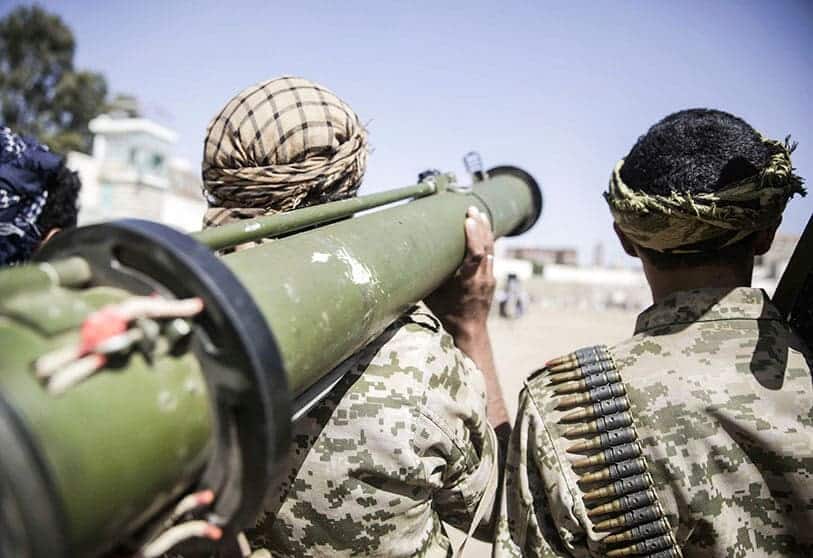
Last updated on: 22-09-2021 at 7 PM Aden Time

Ahmed Mostafa (Al-Ahram)
Media reports this week highlighted how the Muslim Brotherhood-affiliated Islah Party in Yemen has been handing over positions to Iran-backed Houthi rebels in a new obstacle to ending the war in the country that has now lasted for seven years since its outbreak in 2014.
With a stalemate in the fighting around the town of Marib, the Houthi rebels have claimed advances in the Shabwa governorate where government forces, mainly Islah Party fighters, fled to the capital leaving their arms and positions to the Houthi rebels.
The Southern Transitional Council (STC) and other parties in South Yemen are wary of Islah activities, especially in the South. They blame the rise in the presence of Al-Qaeda and Daesh (Islamic State group –IS) terrorists there on the Muslim Brotherhood. Rivalry between Islah and the STC has intensified amid demonstrations blaming the Brotherhood for the deteriorating security situation and territorial gains by the Houthi rebels.
The STC has opposed the movement of Brotherhood-backed Islah forces into Sabwa and Abyan in the South, which southerners say contradicts the Riyadh Agreement of late 2019 between the STC and the government of Yemeni President Abd Rabbu Mansour Hadi.
The chaos in the South has derailed efforts by the UN special envoy to Yemen to stop the war and start negotiations. The Saudi-led Arab Coalition to Support Legitimacy in Yemen is also keen to see a halt to the fighting and the start of a political process. But the Houthi rebels have been stubborn in refusing such efforts.
The Brotherhood component in the Yemeni government seems to be the main beneficiary of this stalemate, exploiting it to gain influence through the disguise of charity outlets that provide money received from backers outside Yemen. Meanwhile, the Brotherhood has been using its position in the government to help the Houthi rebels.
Ali Mohsen Al-Ahmar of the Islah Party, a main Brotherhood member of the government, has been exposed on social media as a “traitor to Yemen.”
US researcher and human-rights lawyer Irena Tsukerman told the online TV channel Aden Today in an interview this week that the rise in terrorist threats in Yemen were linked to Muslim Brotherhood elements strengthening their position within the Yemeni government.
“Ali Mohsen is supported by some factions in Saudi Arabia who think he gives the legitimate government more popular support within Yemen. That is how Islah became an important lobbying force within the government, especially after the US stopped its support for the Arab Coalition,” Tsukerman said.
She added that “in Yemen and everywhere else you cannot separate the Muslim Brotherhood from Al-Qaeda and other terrorist organisations. Many Al-Qaeda terrorists came from Brotherhood ranks.”
This view was shared by Saudi commentator Abdel-Aziz Alkhames in an interview with Al-Ahram Weekly. “Saudi Arabia has designated the Muslim Brotherhood as a terrorist organisation. Yet it deals with the Islah Party as a component of the Yemeni political scene even though the party’s interests are opposed to Saudi interests,” Alkhames said.
“Because of their ideology, Muslim Brotherhood parties are never patriotic,” he added. “They do not believe in a state or a country. They are in government, but they do not care about Yemen. Their loyalty is to the international organisation of the Brotherhood.”
“They divide themselves into wings: one tries to impose conditions on the ground, while another is in government trying to influence it. But their goals are different from those of the legitimate government of Yemen and from the goals of the Southern Yemenis. Their goal is ultimately to achieve opportunistic benefits and to strengthen their hold,” Alkhames said.
Such developments have made it more and more difficult to achieve a breakthrough in the peace negotiations in Yemen. “There are many wars within the war in Yemen, all of them interconnected. The power struggle within the Yemeni factions is also hindering the peace efforts,” Tsukerman said.
She added that two main dangerous influences are the Iranian support of the Houthi rebels and financial support for the Islah Party from the international organisation of the Muslim Brotherhood.
Earlier in the war, Islah collaborated with the Houthi rebels when they first swept the country in 2014. The party’s goal at the time was the hope that if the Houthis prevailed, they would repay the Brotherhood by sharing the country between them.
“I think the Brotherhood in Yemen will continue in this direction. It is part of their nature and ideology. They are always traitors to their homelands,” Alkhames told the Weekly.
“They are also liars. One of their leaders, Zandani, said he had 40,000 fighters ready to stand shoulder to shoulder with the legitimate government and coalition forces. Later, it turned out that he had no one. All the positions entrusted to the Brotherhood fall easily into the hands of the Houthi rebels,” he said.
Alkhames was referring to Islah collaboration with the Houthis in the Yemeni city of Taiz, under rebel siege since the start of the war in 2014. The Brotherhood is active in Taiz, and Islah has had to quell demonstrations in the city against it, as it did with demonstrations against the Brotherhood in Shabwa last week.
One of the main goals of the Islah Party is to sabotage the Riyadh Agreement that reconciles the legitimate government of Yemen and the STC. If successful, this will make the Brotherhood Party more powerful in the government and facilitate efforts to harness the terrorist groups in South Yemen.
This will indirectly help the Houthi cause, complicating further efforts by the UN, the US and Saudi Arabia to end the war in Yemen and start a political process to bring peace to this devastated country.
A version of this article appears in print in the 23 September, 2021 edition of Al-Ahram Weekly
The opinions expressed in this article reflect the opinion of the author
Photo: AP/HANI MOHAMMED
Previous article